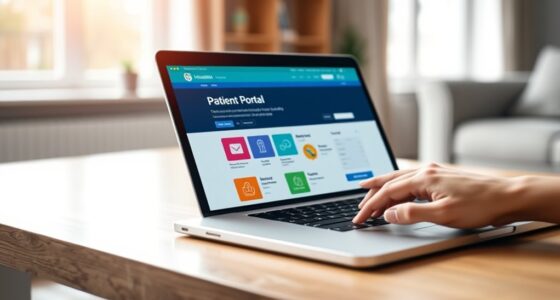Digital solutions for managing health records help you replace paper files with secure digital systems that offer instant access to patient data. They improve workflow, enhance data sharing, and support better decision-making for your patients. These systems also prioritize security and privacy through encryption and access controls, ensuring sensitive information stays protected. By adopting digital solutions, you can streamline operations and improve patient care—if you continue, you’ll discover how to implement these innovative tools effectively.
Key Takeaways
- Electronic health records streamline data storage, retrieval, and sharing among healthcare providers.
- Digital solutions enhance patient care by enabling quick access to comprehensive medical histories.
- Robust security measures like encryption and multi-factor authentication protect sensitive health data.
- Compliance with regulations such as HIPAA ensures data privacy and safeguards against breaches.
- Regular staff training and audit trails help maintain data integrity and build patient trust.

In today’s healthcare landscape, digital solutions have revolutionized how health records are managed, making information more accessible and secure. One of the key advancements is electronic storage, which replaces traditional paper files with digital formats stored securely in cloud-based or on-premises systems. This shift allows you to access patient data instantly, streamline workflows, and reduce the risk of lost or damaged documents. Electronic storage also enables better organization, easier updates, and seamless sharing among authorized healthcare providers, improving overall patient care. With just a few clicks, you can retrieve critical information for diagnosis, treatment planning, or emergencies, saving valuable time and reducing administrative burdens. Additionally, integrating modern data visualizations can help clinicians quickly interpret complex health data, enhancing decision-making and patient outcomes.
However, this progression to digital storage raises significant privacy concerns. Protecting sensitive health information becomes paramount as electronic records are vulnerable to cyberattacks, hacking, and unauthorized access. You need to be vigilant about implementing robust security measures, such as encryption, multi-factor authentication, and regular security audits. Healthcare organizations must also comply with strict regulations like HIPAA to ensure patient privacy is maintained and data breaches are minimized. It’s crucial to establish clear protocols for who can access, modify, or share health records and to educate staff on best practices for data security. Despite these precautions, the digital nature of electronic storage means that data can potentially be compromised if security measures aren’t rigorous enough.
Balancing the benefits of electronic storage with privacy concerns requires ongoing effort. You should regularly update security systems to address emerging threats and conduct training sessions to keep staff aware of privacy policies. Encryption acts as a critical safeguard, ensuring that even if data is intercepted, it remains unreadable to unauthorized individuals. Audit trails are equally important, as they track who accessed or changed records, providing accountability and helping detect suspicious activity. Additionally, patients should have control over their health information, with transparent policies about how their data is used and shared. This transparency fosters trust and encourages patients to embrace digital health records confidently.
Frequently Asked Questions
How Secure Are Digital Health Records From Cyber Threats?
You might wonder how secure digital health records are from cyber threats. They benefit from strong encryption protocols that protect data during storage and transmission. Access controls also limit who can view or modify information, adding extra security layers. While no system is completely foolproof, these measures substantially reduce risks, helping ensure your health data stays private and safe from cyber threats.
Can Digital Health Records Be Accessed Internationally?
Imagine you’re in the 21st century, where international access and cross-border sharing of health records are now possible. You can securely access your health information from anywhere in the world, thanks to digital solutions. These systems enable authorized providers to share records across borders efficiently, improving care. However, strict privacy laws and secure encryption are essential to protect your data during international access, ensuring your health info remains safe worldwide.
What Are Costs Associated With Implementing Digital Health Record Systems?
When considering implementing digital health record systems, you’ll face costs like infrastructure, software, training, and ongoing maintenance. These involve significant investment, but a thorough cost-benefit analysis helps you weigh potential efficiency gains and improved patient care against expenses. Implementation challenges, such as data security and staff adaptation, also impact overall costs. Ultimately, understanding these factors enables you to make informed decisions that maximize benefits while managing expenses effectively.
How Do Digital Solutions Handle Patient Privacy Preferences?
Think of managing patient privacy preferences like a finely tuned orchestra. Digital solutions respect your choices by using patient consent and privacy controls, ensuring your data is shared only when you agree. These systems allow you to set preferences, giving you control over who accesses your information. They continuously monitor and adjust permissions, creating a harmonious balance between data security and accessibility, so your health records stay private according to your wishes.
Are There Interoperability Standards for Different Health Record Platforms?
You should know that interoperability standards like health data standards and data exchange protocols guarantee different health record platforms can communicate effectively. These standards, such as HL7 and FHIR, enable seamless data sharing across systems, reducing errors and improving patient care. By adhering to these protocols, healthcare providers can exchange crucial health information securely and efficiently, making it easier to manage your health data across various digital platforms.
Conclusion
By embracing digital solutions, you streamline health record management, ensuring faster access and improved accuracy. Did you know that over 80% of healthcare providers now use electronic health records? This shift not only enhances patient care but also reduces errors and saves time. So, by adopting these digital tools, you’re helping create a more efficient, safer healthcare system. Embrace technology today, and experience the difference it makes in managing health records effectively.








